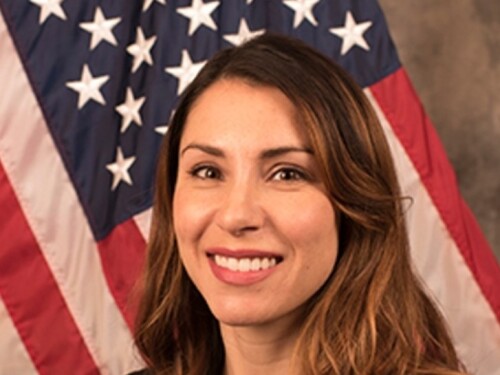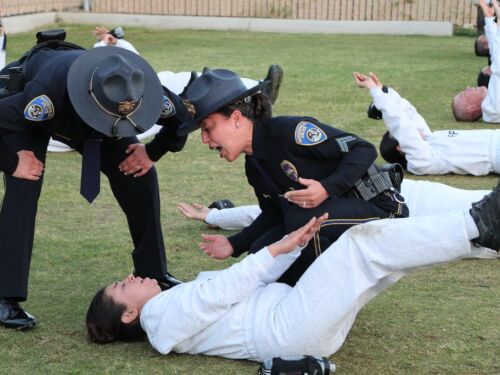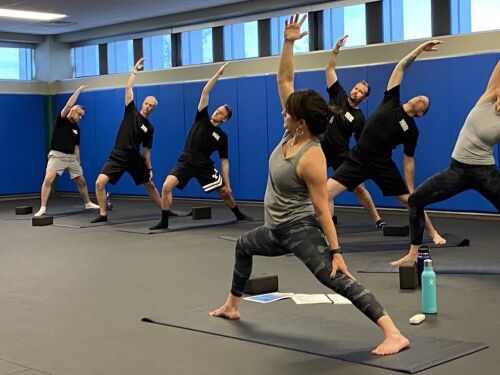Elizabeth Prillinger never envisioned a career in law enforcement. With a background in art history, archaeology and the fine arts, Prillinger’s early career was spent working in galleries and exploring human expression. However, a tragic event outside her San Francisco apartment — where a tourist was murdered — shifted her perspective on public safety. Witnessing how law enforcement handled the case, she saw firsthand the impact officers could have in delivering justice and protecting the community. That moment sparked a new career interest, but joining law enforcement wasn’t immediate.
Several years after the incident, in 2006, Prillinger made the leap, enrolling at the San Francisco Police Department’s police academy and embracing the challenge of becoming a police officer.
Now, nearly two decades later, she serves as a sergeant within the crisis intervention unit and as a hostage negotiator — using her skills to de-escalate high-risk situations and keep officers and civilians safe. Below, she shares insights into her role and the complexities of crisis intervention in a major metropolitan city.
What does a typical day in your role as a hostage negotiator look like?
My role as a hostage crisis negotiator is an auxiliary role, in combination with my regular assignment as part of the crisis intervention team. This means I take on additional responsibilities as a negotiator, which includes responding to active calls that may require some type of negotiation engagement with a subject.
Incidents that require a hostage or crisis negotiator response may include a suicidal subject, a subject whose behaviors present a public safety concern, or a subject who has committed a crime and barricaded themselves, possibly with a weapon, presenting a serious danger component. Sometimes these subjects may be barricaded and refusing persons to leave freely under threat of harm, which could be determined to be a hostage situation. All of these tense factors may come into play, so negotiators work alongside patrol and often tactical units to resolve the situations in the safest and most appropriate way possible.
A typical day can range from having no incidents at all to multiple crisis negotiation calls. San Francisco is a high-activity city and adaptability is crucial. I have to have all my equipment with me at all times. I have to make sure that I am capable and ready to respond if needed because sometimes these incidents will go on for more than several hours. You have to be prepared to go the long haul. Fortunately, we have a robust hostage crisis negotiation team, ensuring multiple trained professionals are always available to respond.
Outside of that auxiliary role of hostage negotiator, my role in the crisis intervention team is also significant. The crisis intervention team is a wide-reaching team. I work in the field unit, which means that I actively go out with officers in the field and engage subjects who have demonstrated a behavioral issue that is either very concerning for public safety or possibly related to a crime. Sometimes a crime has been committed, sometimes it hasn’t, but we are concerned about the safety of the person involved, as well as the public’s safety. We develop specific, individualized strategies for these individuals to ensure the best outcome possible.
What challenges do you face regularly and how do you handle them?
One of the biggest challenges in this role is unpredictability. I never know when an incident is going to happen. Another challenge is that we don’t control where these incidents occur. Some locations are extremely unsafe, requiring quick thinking and strategic adaptation to ensure public and officer safety.
Additionally, individuals in crisis don’t always respond predictably. Despite training and best efforts, they may refuse to engage or de-escalate. Sometimes, when a violent crime has not been committed, a disengagement strategy can help de-escalate the situation so officers can re-engage the subject more effectively, and possibly more safely, at a later time.
It’s also crucial to recognize when to step aside and let another negotiator take over. Ego cannot be a factor in this work.
Can you share a memorable experience that highlights your impact as a hostage negotiator?
One that stands out was a long negotiation — about five or six hours. A subject had climbed a high structure in a San Francisco train yard and shut down all train traffic.
Initially, he intended to harm himself by electrocution on the tracks. When power was cut, he attempted to hang himself from the structure. There were three or four attempts while we were negotiating. He wrapped a belt around his neck and affixed it to the metal structure multiple times.
I remember thinking that this could end tragically. But I had a job to do. It wasn’t about my feelings or the possible outcome — it was about completing the necessary tasks in that moment, using the negotiation strategies we learned in training. Staying calm, maintaining dialogue and using negotiation techniques were critical.
Ultimately, we resolved the incident safely and he was brought into treatment. This reaffirmed the importance of composure, training and trusting the process.
Ever wondered what it takes to be a hostage negotiator? Watch as Prillinger takes you inside a typical day in her role with the San Francisco Police Department, sharing the essential skills needed to defuse high-stakes situations and the most rewarding parts of the job. From crisis intervention to building trust in tense moments, her insights offer a rare look at this critical law enforcement role.
What unique skills or tools are essential for success in your position?
People assume that negotiators are great talkers, but the reality is that the best negotiators are great listeners. Active listening is the foundation of successful crisis resolution. The ability to build rapport and influence a subject’s decision-making process relies on careful listening and interpretation.
Adaptability is also critical. Each situation is unique, requiring rapid assessment and strategic response. Emotional regulation is equally important — negotiators must remain composed even in high-stakes situations.
Patience is incredibly important. In crises, things unfold outside of your control. The environment may not be safe, you may not have an immediate rapport with the subject and you cannot rush the process.
Building influence with someone in crisis takes time. You have to show them you are listening, earn their trust and guide them toward making their own decision. That’s not something that happens in minutes — it sometimes takes hours. If you try to push things too quickly, it can backfire.
Finally, teamwork is key. Crisis negotiation is not about one person — it’s a collaborative effort. Success depends on an entire team working together toward resolution.
What are the most rewarding aspects of your job?
The most rewarding part of my job is knowing I showed up for someone in their most vulnerable moment. Regardless of the outcome, I know I did my best to help them and protect those they may be affecting or harming.
Another deeply fulfilling aspect is ensuring safety. Crisis negotiations often involve significant public safety risks — not just for the individual in crisis but also for officers and bystanders. Successfully de-escalating a situation without harm is incredibly meaningful.
Additionally, officer safety is a priority. Every crisis carries inherent risks. When my team and I can resolve an incident while keeping our colleagues safe, that is an achievement I take great pride in.
You are showing up for other people, and sometimes it’s extremely frustrating, and sometimes the outcome isn’t especially rosy. Sometimes it’s very sad, but if you know in your heart that you did your best, you can carry that with you. And it’s a sort of value that you feel deep inside. I think that’s perhaps the most valuable piece.
Keeping people safe is huge. A lot of the time, these incidents have a real significant danger potential. There’s a danger potential for the person, sometimes a public safety issue based on their behaviors towards others and sometimes an enormous officer safety concern. If you and your team are working well and resolving a situation, you’re not only helping that person live another day but also protecting those around them who could be affected, especially if there is a potential danger.
Finally, another incredibly rewarding aspect of my job in crisis intervention is working with people on treatment. I don’t just engage with individuals in crisis during the incident itself — I often follow up with them, ensuring they receive the proper care and treatment needed. That could mean connecting them with mental health resources, peer support or community services to provide long-term assistance.
Sometimes, the resolution doesn’t happen at the moment of crisis, but in the days and weeks that follow. Seeing someone who was in a dire situation get the help they need and knowing I played a part in that process is one of the most meaningful aspects of this work.
What advice would you give someone interested in pursuing a role as a hostage negotiator?
Officers interested in negotiation should start by looking at their department’s crisis negotiation team. I recommend reaching out to team members or leaders to learn about the process. There may be specific training requirements or prerequisites before applying for a position.
There are excellent external training programs. For example, the FBI has a phenomenal crisis negotiation course that is available to regional law enforcement. There are other training programs, like crisis negotiations provided by Savage Training Group and behavioral threat assessment by Smith Strategics.
Behavioral threat assessment is one of the most important tools negotiators can learn. Understanding when someone is exhibiting concerning behavior, recognizing signs that indicate they may become violent and knowing how to engage them effectively can make all the difference. It allows officers to intervene early, sometimes before a situation escalates into a full-blown crisis.
There are also performance optimization and leadership courses provided by Blue Courage that can help officers gain insight into their own abilities.
Additionally, self-reflection is key. Negotiators need to know what makes them tick. You have to understand your own emotions, biases and triggers to be effective in this role. If you don’t take the time to develop that self-awareness, you might react emotionally instead of strategically in high-stakes situations. That’s why I always encourage officers to take courses not just on tactics, but also on performance actualization and emotional regulation.
Finally, self-care is critical. This job is mentally and emotionally demanding. Officers must prioritize fitness, mental wellness and healthy coping strategies. There are personal wellness podcasts, like Flourish FM, that can help people tap into stress management techniques that will help them function in high-stress jobs.
If you don’t take care of yourself, you won’t be effective in taking care of others.















